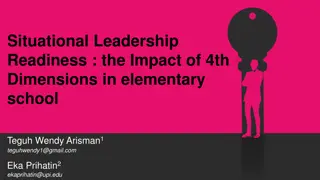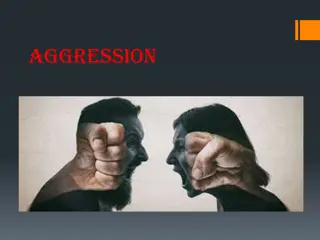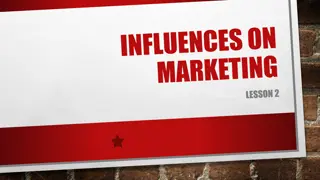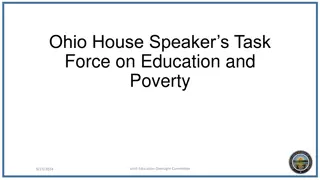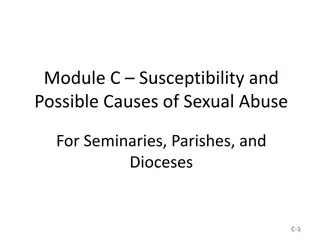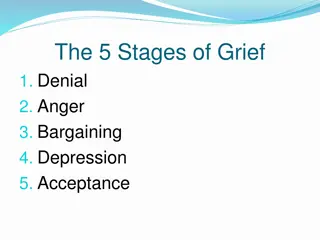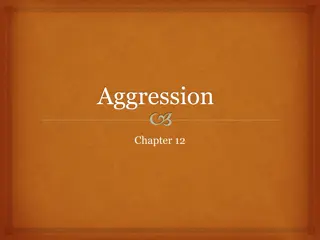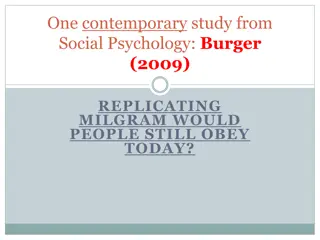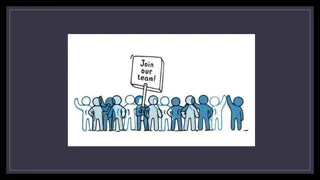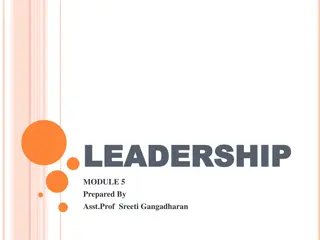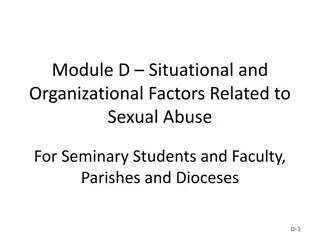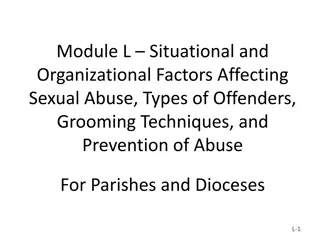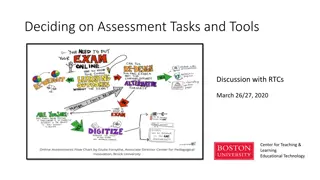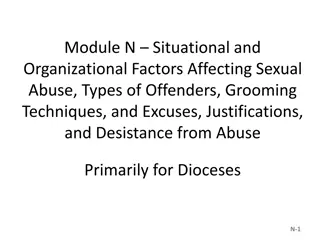Understanding Human Behavior: Foundations and Complexity
Human behavior encompasses the actions and interactions of individuals influenced by factors like genetics, culture, and situational contexts. It involves observable overt behaviors as well as hidden covert behaviors, with a dynamic interplay between individuals and their environments. Psychologists
8 views • 20 slides
Importance of Context in Discourse Analysis
Understanding context is crucial in discourse analysis as it helps interpret the meaning of words based on physical, social, and psychological factors, as well as the temporal and spatial dimensions of communication. Three key types of context include situational, background knowledge, and co-textua
1 views • 12 slides
The Main Factors That Influence the Consumer Buyer Behavior
Consumer buyer behavior is influenced by various factors such as cultural, social, personal, and psychological elements. Culture, social factors like family and opinion leaders, personal factors such as age, occupation, lifestyle, and personality, as well as psychological factors like motivation, pl
2 views • 8 slides
Impact of Situational Leadership Readiness in Elementary School
The study explores how situational leadership styles, specifically in the dimensions of Selling, Telling, Participating, and Delegating, impact elementary school leadership. Research conducted at an elementary school in Ciniru, Kuningan, relied on qualitative methods including observation, interview
1 views • 10 slides
Understanding Personality: Traits, Characteristics, and Influencing Factors
Personality is the unique combination of physical, mental, and behavioral traits that define an individual. It encompasses characteristics like smartness, dress sense, attitudes, and values. Personality is influenced by biological, environmental, and situational factors, and can be analyzed through
1 views • 49 slides
Analysis of Individual Risk Factors in Ventral Hernia Repair Outcomes
This study explores the impact of various risk factors on predicting adverse outcomes of ventral hernia repair using data from the Abdominal Core Health Quality Collaborative (ACHQC). The research aims to quantify and compare the influence of different factors, hypothesizing that hernia- and procedu
0 views • 14 slides
Understanding Language Teaching Syllabus: Integration, Theory, and Approaches
Language Teaching Syllabus involves the integration of subject matter and linguistic elements, guided by theories of language and learning. Various approaches like Grammatical, Situational, Communicative, and Analytic are used to structure syllabi. Breaking language into parts aids in sequential lea
1 views • 28 slides
Understanding Aggression: Causes and Solutions
Aggression is any intentional behavior aimed at harming others, whether physically, verbally, or emotionally. It can be instrumental or hostile. Biological factors like hormones and neural substrates, social/cultural factors such as frustration and provocation, and environmental/situational factors
0 views • 10 slides
Understanding Irony in Verbal, Dramatic, and Situational Contexts
Explore the nuances of verbal, dramatic, and situational irony through examples and explanations. Verbal irony involves saying something different from what is meant, often using humor like puns. Dramatic irony occurs when the audience knows something the characters don't, creating suspense. Situati
0 views • 12 slides
Understanding Hospital Bed Turnover and Situational Leadership Characteristics
Hospital bed turnover is crucial for assessing hospital productivity, with turnover interval (TOI) indicating the average period a bed remains empty. Bed turnover rate (BTR) measures patient care efficiency. Situational leadership, adaptable to group needs, involves directing and coaching based on g
2 views • 7 slides
Understanding Environmental Factors in Terrestrial and Aquatic Environments
Environmental factors play a crucial role in shaping ecosystems. In both terrestrial (land) and aquatic (water) environments, organisms are influenced by abiotic factors such as temperature, light intensity, and pH, as well as biotic factors like plants, predators, and competitors. Understanding the
4 views • 19 slides
Factors Affecting Microbial Growth in Food: Intrinsic and Extrinsic Factors
In food, microbial growth is influenced by intrinsic factors like pH, water activity, nutrient content, and extrinsic factors such as environmental conditions. The pH level, moisture content, and water activity play crucial roles in determining the growth of microorganisms, with specific ranges affe
0 views • 23 slides
Factors Influencing Customer Choice: Psychological, Sociocultural, Economic, and Government Factors
Psychological factors, such as perception and lifestyle, play a key role in customer choice. Sociocultural influences from society and culture also impact decisions, while economic factors like income levels and government policies can sway customer preferences. Understanding these factors is crucia
0 views • 18 slides
Exploring Situational Leadership and Mindset in Educational Leadership
This educational session delves into Situational Leadership, utilizing the Hersey-Blanchard framework, to tailor leadership approaches based on the mindset, skill, and will of educators. It also discusses growth versus fixed mindsets and includes a practical mindset vignette for application. Partici
0 views • 13 slides
Comprehensive Guide to Factorization in Mathematics
Explore the concept of factorization in algebraic expressions, including the definition of factors, common factors, methods of factorization, and illustrated examples. Learn about finding factors, common factors, and various factorization techniques such as common factors method and regrouping of te
0 views • 13 slides
Understanding Sexualized Behavior in Children: Evaluation and Development
Evaluating sexualized behavior in children involves considering normal development, situational and environmental factors, abuse sequelae, and neurodevelopmental problems. There is no fixed definition of sexualized behavior due to varying contexts, age-appropriate norms, and cultural influences. Com
0 views • 35 slides
Enhancing Defensive Skills and Situational Awareness in Hockey
Enhancing defensive skills and situational play in hockey is crucial for success. All team members can contribute to team defense by developing skills like skating, body checking, understanding the ice surface defensively, read and react abilities, and effective communication. Proper skating skills
3 views • 45 slides
Understanding Irony: Verbal, Dramatic, and Situational Examples
Dive into the world of irony with examples of verbal, dramatic, and situational irony explained through scenarios like sarcastic comments, horror movie twists, and unexpected encounters. Explore how irony adds layers of meaning and depth to storytelling, from characters knowing more than others to o
0 views • 10 slides
Understanding Attribution Theory: Exploring Dispositional vs. Situational Attribution
Attribution theory examines how people explain behavior and events by analyzing internal vs. external causes. Heider's influential ideas on dispositional vs. situational attributions are discussed. Dispositional attribution focuses on internal characteristics, while situational attribution relates b
0 views • 14 slides
Ecological Factors and Climatic Influences on Plant Life
Ecological factors play a crucial role in shaping the environment for organisms to thrive. This includes living (biotic) and non-living (abiotic) components like climatic factors, edaphic factors, topographic factors, and biotic factors. Climatic factors such as light, temperature, water, wind, and
0 views • 14 slides
Understanding Poverty and Education Disparities in Ohio
Explore the various factors contributing to education and poverty disparities in Ohio through data on achievement gaps, graduation rates, dropout rates, and risk of developmental delays in children. Delve into the conditions of poverty in different counties in Ohio, highlighting situational and gene
0 views • 15 slides
Understanding Susceptibility and Causes of Sexual Abuse in Catholic Institutions
Exploring the susceptibility and possible causes of sexual abuse in seminaries, parishes, and dioceses. The research highlights factors contributing to abuse, including organizational, psychological, and situational elements. It emphasizes the importance of education for potential victims, abusers,
0 views • 39 slides
Understanding the 5 Stages of Grief and How to Help Others Through Them
The 5 stages of grief - Denial, Anger, Bargaining, Depression, and Acceptance - are explored, with tips on how to support those experiencing them. Grief doesn't follow a linear path, and cultural, personal, and situational factors influence how individuals grieve. Children coping with loss should be
0 views • 10 slides
Insights into Aggression: Causes, Gender Differences, and Influencing Factors
Aggression is intentional behavior aimed at causing harm, with instrumental and hostile forms. Gender differences show males are more physically aggressive, while females engage in relational aggression. Aggression is influenced by situational and cultural factors, with influences from alcohol. Unde
0 views • 31 slides
Replicating Milgram's Obedience Study: Burger's Contemporary Research
Burger's 2009 study aimed to partially replicate Milgram's famous obedience experiments to explore if obedience levels have changed over time, focusing on the influence of situational factors. Using a similar setup, Burger found that individuals still exhibit high obedience rates, challenging assump
0 views • 44 slides
Factors Influencing Prosocial Behavior in Social Situations
This selection of specialized psychological texts delves into the specific determinants of prosocial behavior, highlighting the impact of various factors on individuals' willingness to offer aid. It discusses how characteristics of the helper and person in need, along with situational elements like
0 views • 35 slides
Conducting Threat Assessments Through the Atrocity Prevention Lens
This module from the GLOBAL CENTRE FOR THE RESPONSIBILITY TO PROTECT focuses on conducting threat assessments through an atrocity prevention lens. It covers risk identification, situational awareness in field settings, information collection methods, addressing vulnerabilities of women and children,
0 views • 20 slides
Understanding Factors and Prime Factors in Mathematics
Explore the concept of factors and prime factors through practical scenarios involving Jedward, stationary supplies, and school choirs. Learn how to find factors of numbers like 18 and 30, identify prime numbers, write numbers as products of prime factors, determine common factors, and calculate low
0 views • 19 slides
Messy Situational Map Template with Suggestions for Use
This SA template provides a messy situational map template along with suggestions for use. The initial map should be done by hand on a large piece of paper to allow for quick adjustments and capturing thoughts. The template includes an abstract map and a customizable version for creating more readab
0 views • 4 slides
Comprehensive Overview of Leadership Theories and Styles
Leadership encompasses the ability to influence a group towards achieving goals by knowing oneself, communicating vision, building trust, and taking effective action. Various leadership styles include Autocratic, Democratic, Free-Rein, and Paternalistic, each with distinct decision-making approaches
0 views • 19 slides
Understanding Assessment Centres: Psychometric Tests, Situational Judgement, and More
Assessment centres often include psychometric tests, ability testing, and situational judgement assessments to evaluate candidates. These tests help employers understand your personality, behaviours, decision-making skills, and ability to work in different scenarios. By participating in these assess
0 views • 25 slides
Leadership Insights: Traits, Differences, and Framework
Leadership involves guiding others towards shared goals through vision, inspiration, knowledge, and resilience. It distinguishes from management in focus and approach. Analyzing leadership involves assessing leader traits, situational factors, and follower dynamics. The leadership framework comprise
0 views • 36 slides
Situational and Organizational Factors in Sexual Abuse by Catholic Priests
The content discusses situational and organizational factors related to sexual abuse involving seminary students, faculty, parishes, and dioceses. It covers settings and circumstances of sexual abuse, including locations where victims first encountered abusive priests. Data reports from the United S
0 views • 28 slides
Understanding Situational Factors in Sexual Abuse by Catholic Priests
This module delves into the situational and organizational factors influencing sexual abuse of minors by Catholic priests, exploring types of offenders, grooming techniques, and prevention strategies for parishes and dioceses. It highlights key data reports on sexual abuse cases, examines settings a
0 views • 49 slides
Understanding Situational Crime Prevention Strategies
Situational crime prevention strategies aim to reduce crime by altering environmental conditions, influencing offender decisions, and targeting crime opportunities. Primary prevention focuses on modifying physical and social environments, while secondary prevention aims to identify potential offende
1 views • 31 slides
Exploring Assessment Tasks and Tools in Educational Technology
Discussion on deciding assessment tasks and tools, guiding principles, factors impacting decisions, situational questions for faculty, and examples of discussions with faculty regarding assessment methods. It covers various considerations such as time, costs, technology, exam types, integrity, and s
0 views • 16 slides
Understanding Vulnerability in Research Populations
Vulnerability in research populations refers to being exposed to harm without the ability to protect oneself adequately. Factors contributing to vulnerability include intrinsic limitations like decision-making capacity and situational influences such as political or economic circumstances. Different
0 views • 22 slides
Understanding Irony: Types, Purpose, and Examples
Irony is about expectations and contrast between reality and what is being said. It can add interest, depth, suspense, and humor to texts. The three types of irony are verbal, dramatic, and situational, each serving a unique purpose to engage the audience. Examples from popular stories like Beauty a
0 views • 12 slides
Understanding Sexual Abuse of Minors by Catholic Priests
This content delves into the situational and organizational factors affecting sexual abuse of minors by Catholic priests, exploring types of offenders, grooming techniques, excuses, justifications, and desistance from abuse. It presents data from reports by the John Jay College Research Team and the
0 views • 59 slides
Enhancing Situational Awareness for Home Visit Safety
Situational awareness is crucial for observing and being attentive to your surroundings to prevent accidents and errors. Understanding different levels of situational awareness, from a relaxed alert state to an active threat response, can significantly improve safety and decision-making in everyday
0 views • 14 slides



